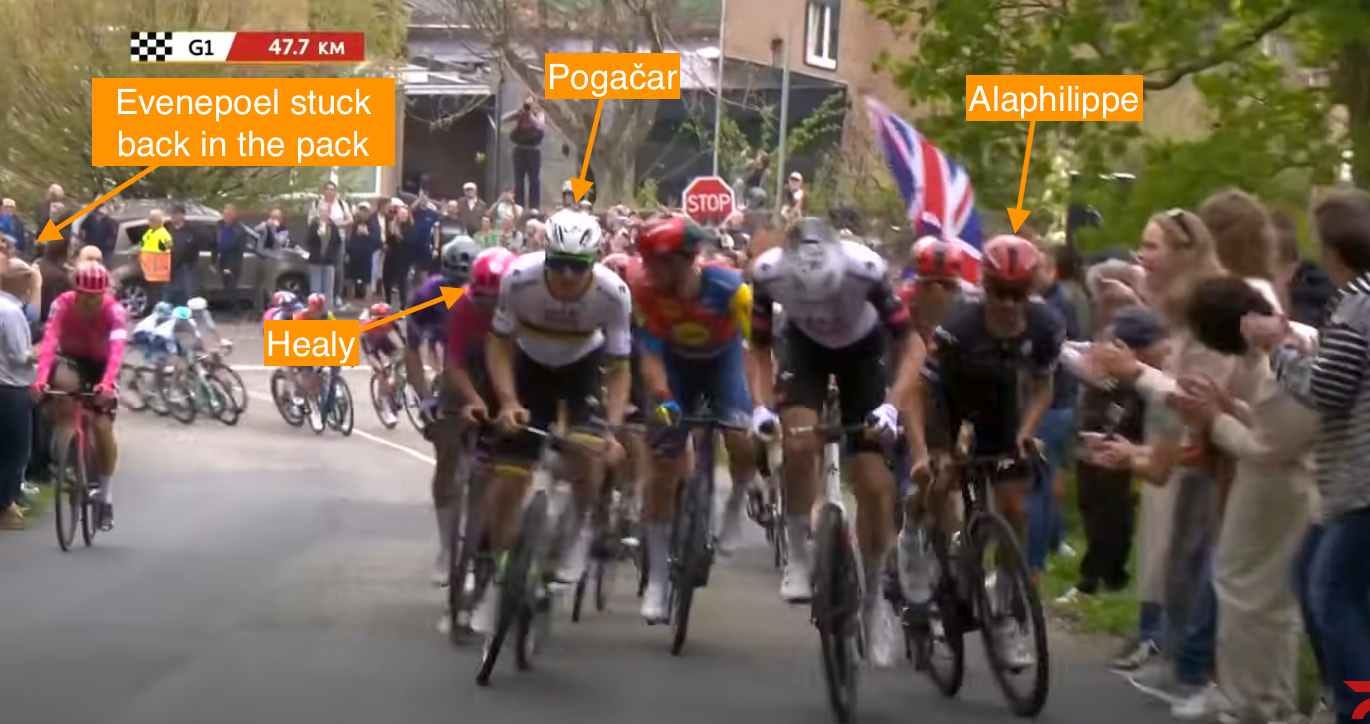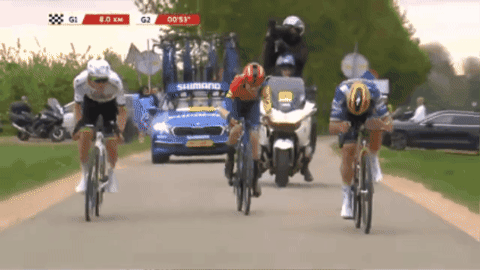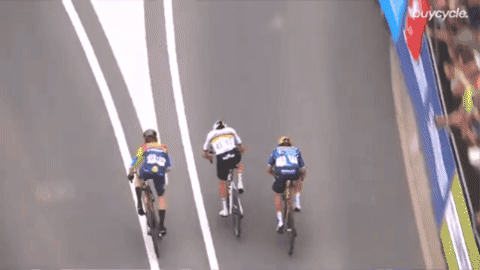Key Takeaways: Amstel Gold 2025
Breaking down how Sunday's one-day battle created a surprise victory that was without a doubt the most exciting race of the year up to this point
Across the punishing hills of Dutch Limburg, Mattias Skjelmose stunned the sport’s two biggest stars—Pogačar and Remco Evenepoel—to take the biggest win of his young career in a three-up sprint at the 2025 edition of Amstel Gold on Sunday. After a week of speculation around whether Tadej Pogačar could begin an audacious Ardennes sweep just seven days after finishing second at Paris-Roubaix, a tactical chess match flipped conventional wisdom on its head, with Skjelmose and Evenepoel successfully reeling in Pogačar after the World Champion launched his now-trademark long-range solo attack, before Skjelmose capitalized on the two superstars focusing solely on each other by slotting into third wheel before sprinting by both favorites to pull off one of the season’s biggest upsets.
Check out the defining points of the race, and my five key takeaways below:
Amstel Gold 2025 Top Ten
1) Mattias Skjelmose (Lidl-Trek) +0
2) Tadej Pogačar (UAE Team Emirates-XRG) +0
3) Remco Evenepoel (Soudal Quick-Step) +0
4) Wout van Aert (Visma-Lease a Bike) +34
5) Michael Matthews (Jayco AlUla) +34
6) Louis Barré (Intermarché-Wanty) +34
7) Romain Grégoire (Groupama-FDJ) +34
8) Tiesj Benoot (Visma-Lease a Bike) +34
9) Thomas Pidcock (Q36.5 Pro Cycling) +34
10) Ben Healy (EF Education-EasyPost) +34
BTP’s Spring Classics Coverage is brought to you by JOIN Cycling
The JOIN Cycling App is a smart training platform that adapts to your schedule, goals, and fitness level, offering dynamic, science-backed workouts. It’s perfect for cyclists of all levels, balancing training and recovery efficiently. With AI-driven adjustments and flexibility, JOIN helps you stay motivated and improve consistently. Redeem a free month through our special BTP link.
Amstel Gold Race Notebook
BTP is seamlessly following every twist and turn of the 2025 Classics Season with the fantastic Tour Tracker app (iPhone/Android/Web)
47.7km-to-go: With the UAE setting a hard pace that has caught the breakaway and deterred riders from slipping up the road, Julian Alaphilippe launches a scorching attack after the peloton takes a right-hand turn into one of the race’s numerous short climbs. Pogačar is sitting near the front, with Ben Healy directly on his wheel, while Remco Evenepoel is buried deep in the back.
47.6km: Pogačar immediately responds to the powerful move due to his superior positioning. Evenepoel, stuck in the back, doesn’t have the opportunity to follow, and likely doesn’t even know it is happening.
47.4km: While Pogačar’s superior positioning allows him to respond to Alaphilippe’s moves, the question of whether he should have begins to bubble when a slight, and rare, show of discomfort appears on Pogačar’s face as the duo pulls clear, under the pacesetting of Alaphilippe, of a hard-chasing Ben Healy and Thibau Nys.
42.5km: Pogačar soon begins to share turns with Alaphilippe, and the duo builds up an advantage of just over ten seconds. As soon as they hit the next short climb, Pogačar attacks, dropping his companion and sealing his fate, meaning that he is now fully committed to a solo-breakaway end-game.
36.7km: Pogačar quickly builds up an advantage of half a minute as the riders behind struggle to mount an organized chase, instead opting for the doom-loop of attack, chase, and stall. However, Evenepoel’s Soudal-QuickStep team soon makes a race-saving decision, with Ilan Van Wilder coming to the front to set a hard, steady pace that thins down the group and keeps the gap from growing to an insurmountable level.
31.9km-25.5km: With the gap holding at 28 seconds, Mattias Skjelmose attacks, knowing that an Evenepoel bridge attack is imminent, so when Evenepoel surges from the chase group, and nobody else is able to grab his wheel, Skjelmose is in the perfect position with Evenepoel riding to him, instead of attempting to follow an uber-strong rider with no draft.
24.5km-20.7km: Just a kilometer after attacking, Evenepoel makes contact with Skjelmose. While the two riders hold just a slight advantage over the Van Aert-led peloton, Evenepoel is so strong and gets just enough help from Skjelmose that they maintain their slim gap on the chasers while quickly cutting Pogačar’s lead down to 16 seconds.
15km-8km: After roughly 10 kilometers of Evenepoel driving hard on the climbs and leveraging his ultra-aero position, along with some helpful pulls from Skjelmose into the stiff wind, the chasing duo reel in Pogačar. Behind, the chase group falls apart, seeing their gap grow to nearly a minute (which causes Wout van Aert and Michael Matthews to lose the race over this stretch).
8km-6.4km: As soon as Evenepoel makes contact with Pogačar, he rips by the leader, presumably attempting to catch him off guard and drop him here. Of course, this doesn’t work against such a strong rider, who is able to quickly slot in behind Evenepoel (while Skjelmose slots into the best position in third), but it does give us a great visual reminder of just how fast Evenepoel is in his low-profile road bike position and how much he can punish the others without even leaving the saddle.
2.2km-1.2km: On the final pass of the Cauberg, Evenepoel is clearly riding high from his sprint win on Friday and appears happy to take things to the line as he sits defensively on the front, watching closely for an attack from Pogačar. Again, Skjelmose is allowed to sit in third wheel as though the others have forgotten he is there.
250m: Just like Friday at De Brabantse Pijl, Evenepoel opens up his sprint incredibly early, hoping to make the sprint so hard that the others can’t come past.
50m: However, unlike Friday, the slow pace in the kilometers leading into the sprint has allowed the riders on Evenepoel’s wheel to spend significant time below threshold, and Pogačar uses this to come past Evenepoel, while Skjelmose slingshots out of prime position in third wheel.
Finish: But, while Pogačar gets by a fading Evenepoel, Skjelmose uses the pace he has built up coming out of the two riders’ slipstream to come around Pogačar just before the finish line to execute the biggest upset so far in the 2025 season.
Five Key Takeaways
1) Mattias Skjelmose Showed How to Foil Galácticos: The 24-year-old Dane shocked the cycling world by seemingly coming out of nowhere to win his first career one-day WorldTour race by beating a pair of riders so elite that they are two of the four riders to have won a top-tier one-day race (Monument, Olympics, World Championships) over the last 2.5 years, along with accounting for nearly half of those wins. While he needed a lot to go right and mistakes to be made (more on that below), the underdog nature of his win obscured the fact that Skjelmose is a budding star in his own right, and possesses a combination of physical and tactical skills that set him apart from nearly every other non-Galáctico in the sport.
The fact that Skjelmose won a top one-week stage race, the Tour de Suisse at just 22, and finished 5th overall at the Vuelta a España at 23, might not jump off-the-page in an era where Pogačar won the Tour at just 21, but these are massive results, and show us that he is a legitimate potential future star with a uniquely powerful engine and tactical nous.
For example, despite having plenty of evidence that following and surviving a full-on Evenepoel attack is nearly impossible, everyone else sat in the group waiting for him to launch, while Skjelmose took advantage of a lull in pace to get ahead of the move. This meant he wasn’t forced to match Evenepoel’s initial burst and instead got to slot onto his wheel once he was already at cruising speed, making it easier for Skjelmose to tuck into his barely-there slipstream.
But, even after setting himself up to grab Evenepoel’s wheel, there aren’t many riders in the peloton who have the raw strength to hold Evenepoel’s wheel, while also contributing to the pacesetting enough to keep Evenepoel from dropping them, after being solo off the front that late in a race.
And, this elite engine, along with the fact that the others surrendered the most advantageous sprint position, allowed Skjelmose to be ‘fresh’ enough to win the three-rider sprint despite not having an elite sprint.
2) Fatigue & Small Tactical Mistakes Finally Caught up to Tadej Pogačar: The ultra-versatile superstar saw his attempted Ardennes Sweep unravel before it even began due to a series of tactical mistakes, but the biggest issue was likely simply the fatigue he carried into the race from last weekend’s Paris-Roubaix (there is a reason only a single rider, Jan Raas, has ever won both Paris-Roubaix and Amstel Gold in consecutive weekends).
Knowing that Roubaix-fatigue caused Mathieu van der Poel to look shockingly mortal in last year’s edition of this race after looking unbeatable seven day prior, Pogačar likely should have come into Sunday’s Amstel with slightly more restraint, and opted not to follow Julian Alaphilippe’s doomed attack, which was never going to work, and meant Pogačar had to commit to over an hour of all-out effort on a course that favors late attacks and small group sprinters.
Of course, declining the perfect uphill leadout simply isn’t in Pogačar’s DNA, and, with such a stellar record with solo breakaways, he was always going to seize the opportunity.
Before Sunday, I’ve counted only two occasions since 2020 where Pogačar has been reeled in after a solo attack in a one-day race, with only two of those results in a loss:
Solo Attacks by Pogačar Reeled In (One-Day Races Only)
2020 World Championships (Imola)
Attack: ~42km to go
Caught: ~21km to go
Result: Lost: Caught and did not win
2021 Il Lombardia
Attack: ~36km to go
Caught: ~16km to go
Result: Won: out-sprinted Fausto Masnada
But, even outside of launching a solo attack only a week after finishing the sport’s hardest race in second place, another major mistake Pogačar made was focusing too heavily on Evenepoel, and forgetting that Skjelmose is an incredibly talented rider, and ceding prime sprinting position to him.
3) Remco Evenepoel’s Loss Illustrates Why the Strongest Rider Should Always Try to Avoid a Sprint: On a day where he reinforced the idea that he is back from his injury-induced racing layoff at an incredibly high level, Evenepoel illustrated why the strongest rider in a race should do everything in their power to keep a race from coming down to a sprint.
If Pogačar’s decision to launch a solo attack from over 40 kilometers from the finish line was a grave mistake, Evenepoel’s decision to be at the back of the bunch when it happened might have been equally fatal.
Considering he was able to rip clear of the peloton and mow down Pogačar, Evenepoel was likely the strongest rider in the race on Sunday. Outside of good legs, his ultra-aero road bike position and the rolling terrain with flat sections meant his weaknesses relative to Pogačar, sustained climbs, would have been minimized, and his strengths, pure flatland speed, would have been emphasized.
So, if the roles were reversed and Evenepoel had attacked from a long way out, just like Friday, he would have been essentially uncatchable to anyone behind and given more time to punish anyone on his wheel.
His incredible performance to reel in Pogačar combined with his failure to win the race perfectly encapsulates the Evenepoel spectrum, and why he will struggle to grab a victory over Pogačar next Sunday at Liège–Bastogne–Liège.
4) The Chase Group’s Collapse Hides Wout van Aert’s Impressive Spring: It will be lost to the sands of time due to the thrilling battle amongst the podium, but the chase group, which Wout van Aert and Michael Matthews led in, finished just 34 seconds behind the winner after cutting their gap down by nearly half a minute inside the final few kilometers.
With the leading trio stuck in a stalemate post-Pogačar catch, a full re-grouping before the finish line was not totally out of the question, especially with Amstel being the major one-day race with a parcours most amenable to chase groups coming back in the final kilometers.
However, the almost complete collapse of the chase, which saw the gap to the lead group go from a handful of seconds to nearly a minute between 20km and 8km to go, doomed their chances.
The biggest loser of this is Van Aert, who racked up yet another 4th place and has now been relegated from Galáctico to mere mortal, but this hides a truly impressive spring, where he has failed to finish outside the top four through all five of his races in the month of April, and is the only other rider, along with Pogačar, able to finish in the top ten of both this year’s Roubaix and Amstel.
This shows that he is slowly building back to the level that saw him win three stages and in control of the Sprinters’ and Climbers’ jerseys at the 2024 Vuelta a España, before crashing out with a nasty knee injury and is now heading toward what could be a stage win-filled Giro d’Italia and Tour de France later this year.
5) Don’t Expect This Upset to Suddenly Open Up One-Day Racing: Sunday’s race showed that despite a historic pooling of wins by the sport’s top riders, it is indeed possible for mere mortals to win against the sport’s Galácticos. However, instead of showing the rest of the peloton a replicable blueprint that could usher in a new era where regular riders can start racking up major one-day victories, it instead illustrates that it is only possible with the right mix of mistakes from the favorites, correct decisions, and immense talent, from the underdog, and a bit of good fortune.
For example, on Sunday, Skjelmose showed that the only way to battle the top favorites is to get ahead of the move. While this hasn’t been available in past races, there was a small sliver of an opportunity when the chase slightly stalled out on Sunday, and Skjelmose took advantage by ripping off the front and readying himself for the inevitable Evenepoel bridge.
But, while it worked out for the underdog yesterday, it took a fellow Galáctico in Remco to fully commit to reeling him in while not minding that he was pulling Mattias along. This mirrors the other scenario where an attacking Pogačar was reeled in, Stage 11 of the 2024 Tour de France, when Jonas Vingegaard committed to reeling in a fading Pogačar and was rewarded with a stage win.
However, considering how this ultimately turned out for Remco, it isn’t clear that other top riders will take the lesson that chasing down Pogačar with other riders on their wheel is a good idea.
If anything, it will show the top riders that they need to make sure to attack earlier and earlier, to avoid being dragged down into the same type of tactical battle that allowed the massive underdog to beat the two superstars.


















